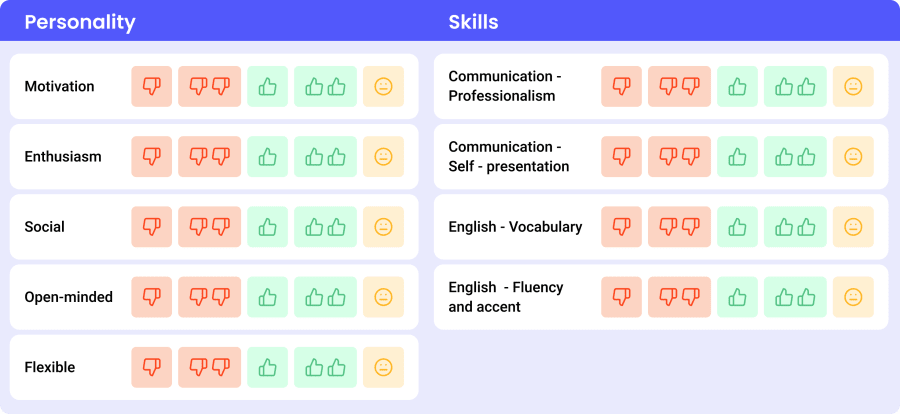About React
React.js is an open-source JavaScript framework that focuses on creating user interfaces. It is one of the greatest front-end development frameworks since it allows developers to create robust and complex products while still being simple to integrate into existing apps.
Developers use React to create large-scale web applications that can change data without reloading the page. The core goal of React is to be quick, scalable, and user-friendly.
Additionally, React is compatible with various JavaScript libraries and frameworks and is used by a number of famous companies, such as Meta (formerly Facebook), Netflix and more. However, do not mix it up with React Native, which is mostly used to develop cross-platform mobile applications.
The whole development and maintenance of UI components are handled by a React.js developer. They create applications and front-end designs, application components, and user interfaces. And as any professional in software development, the best ones are not that easy to find!
React.js developer stats
If you think React.js would be the right software solution for your project, it doesn’t hurt to learn about some general statistics about developers well-versed in this framework and other compatible programming languages.
According to Stack Overflow’s 2022 report, React.js is now the most popular web framework that professionals want to work with, surpassing the second-rated Node.js by around 6 percent. And this data is based on the response of 57654 professional developers.
The volume of respondents alone shows you the large number of developers that are fluent in this framework, although it is hard to determine how many React developers are there globally. But that doesn’t mean there is a surplus of good React devs: in fact, more than 8700 globally use it for their web development projects.
And when it comes to the cost of hiring a React developer, the hourly rates alone can get up to 60 dollars. Not to mention the cost of job advertising, recruitment, onboarding, vetting and the cost of disruption in your developers’ team until you find the best person for the job.
Interviewing a React.js developer
Tips for your pre-screen
The road to hiring an amazing developer full-time starts with a pre-screen call. This call is less focused on technical skills, and more on “weeding out” the candidates you deem unprofessional or simply not to be a good culture fit.
Our Head of Recruitment Nadya Pokhyla uses a practical approach to scoring candidates in pre-screens with a useful scorecard.

"I pay high attention to their professionalism, self-presentation and communication skills; as well as motivation, enthusiasm, English-speaking skills and many other important points we evaluate during pre-screen. I like to ask myself this question: ‘Would I work with this person as a colleague?‘"
 Nadya Pokhyla
Nadya Pokhyla
Talent Acquisition specialist Evgenia Kashchuk adds:
"After conducting a lot of interviews, I can say that the main non-technical skills are presentability (everything starts with a call with a recruiter), openness, sociability, honesty, curiosity, flexibility."
 Evgenia Kaschuk
Evgenia Kaschuk
Top technical skills to look for in React.js developers
Since finding the best React.js devs can be a pretty daunting task (and costly too!), we’ve asked our recruiters and technical interviewers to help us pinpoint the most important skills they should possess, apart from great knowledge of React.js itself and their years of experience.
According to skilled React engineer and technical interviewer Terri Prifti, these are the three most important technical skills a React.js dev should have:
"A React.js developer should be able to write HTML + CSS and be aware of responsive web principles. They should also be familiar with JSX syntax and understand the fundamentals of JavaScript language (for example data types, DOM manipulation, “this” keyword, callback functions)."
 Terri Prifti
Terri Prifti
He adds that a great React developer should be familiar with:
- High Order Components (HOCs);
- Shallow rendering components;
- Being able to avoid prop drilling;
- Writing tests.
Talent acquisition specialist Catherine Fialkova underlines that “a good React.js developer should work with HTML tags, write CSS selectors, understand the box model and how to reset the border-box, and have an understanding of flexbox".
"Every React developer should also have an understanding of how Git is handled and have a profile on GitHub or GitLab. JSX is an abstraction of React. It is vital for a developer to have knowledge of this extension of HTML."
 Catherine Fialkova
Catherine Fialkova
Top non-technical skills in React.js developers
Some other qualities that you should consider when doing the first-ever interview with a candidate, according to Fialkova are:
- Clear and professional communication approach;
- Upper-Intermediate or higher English level;
- Ability to get on well with any team;
- Leadership ambitions;
- Ability to support and mentor the junior colleagues;
- Punctuality when it comes to attending the meetings or completing the tasks on time.
Interview questions to ask
- What are the features of React?
Expected answer: The important features of ReactJS are:
- JSX
- Components
- One-way Data Binding
- Virtual DOM
- Simplicity
- Performance
- Why use React instead of other frameworks, such as Angular?
Expected answer: React outperforms Angular due to its virtual DOM implementation and rendering optimizations. Additionally, switching between React versions is simple since, unlike Angular, you don't need to install updates one at a time. Finally, various ready-made solutions are available to developers using React.
- What is an event in React?
Expected answer: An event is a potential action that might be brought on by a user or system-generated event. Events include mouse clicks, web page loads, key presses, window resizing, and other interactions.
- What are synthetic events in React?
Expected answer: A cross-browser wrapper for the native event of the browser is a synthetic event. It has the same interface as the native browser events, such as preventDefault() and stopPropagation(). However, the events are universally functional across all browsers.
- What is the difference between Hooks and Redux?
Expected answer: React Hooks features handle the local component state while Redux manages the global state and actions that can be dispatched.
- How do you manage folder structure?
Expected answer: React doesn’t have a rule on how you put files into folders, but some more common approaches are grouping by features or routes or grouping by file types.
- What is the React component lifecycle?
Expected answer: In React, each component has a lifecycle that you can track and control throughout its three primary phases. Mounting, updating, and unmounting are the three steps.
- How can you avoid component re-rendering?
Expected answer: To avoid re-rendering per component, you should use the shouldComponentUpdate() lifecycle.
- Give me three advantages of using hooks in React.
Expected answer: Using React Hooks provides three benefits: reusability, readability, and testability.
- How often does React useState update, and why?
Expected answer: React delays updating updates because developers utilize useState to improve speed by building queues. Candidates should be aware that useState updates happen asynchronously rather than immediately implementing changes to the state object.
- What is the biggest benefit of using Flux?
Expected answer: You can control how data flows through your program by utilizing Flux. You may more effectively analyze data changes and troubleshoot issues by adopting an unidirectional data flow with predefined responsibilities for each component (action, store, and view).
- How do you create refs?
Expected answer: React is used to build Refs. Using the ref attribute to attach to React elements after calling createRef(). When a component is created, refs are frequently set to an instance property so that they may be used as references throughout the component.
- How would you optimize performance in a React app?
Expected answer:
- By keeping the component state local, when necessary
- By remembering React components should avoid needless re-renders
- By code-splitting with dynamic import
- Through React's windowing or list virtualization
- With React's lazy image loading
- What would you avoid binding in React?
Expected answer: I can use arrow functions in class properties to avoid binding in React. Class properties are a new feature and to use them, I must enable transform-class-properties.
- Tell us about previous projects you’ve worked on that were built on top of React.js.
Example answer: I have worked on a messaging app/real-time chat app/personal blog/e-commerce mobile application.
What sets apart a great React.js developer from a good one?
When it comes to the fine-tuned technical details that a great React dev could have, Prifti looks deep into the details of the code.
“I see all the differences in the import order, object destructuring, usage of memoized components, avoid defining functions inside render, usage of object literals.”
For Catherine, beyond mastering the expected tech stack, the most important criteria is that the developer can work without being supervised and reminded about their tasks:
“They should be able to present themselves and their work without constant supervision. Extra points if they take on more than only React-related tasks, have the agency to make their own decisions and a desire to learn new things.”
 Norsk
Norsk






















